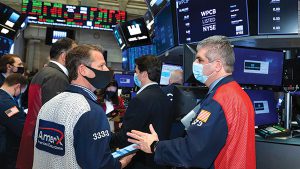Bloomberg
US equity-index futures witnessed volatile trading even as European stocks fall amid a spike in sovereign yields as
investors digested the Federal Reserve’s indication of a more aggressive policy tightening.
Contracts on the technology-heavy Nasdaq 100 Index were down 0.4%, after a loss of as much as 0.9%. S&P 500 Index futures lost 0.2%, after a 0.5% drop earlier in the session. Europe’s Stoxx 600 gauge slumped 1.4%. Treasury yields rise, with a typical increase of three basis points between the two-year and 30-year tenors. The dollar advanced and the yen received a haven bid.
Even as investors face a wall of worries from the pandemic to China’s regulatory crackdowns, the start of 2022 has brought Fed policy right into the core of the outlook for global markets. The bank’s minutes of its December meeting showed officials said a strengthening economy and higher inflation could lead to faster rate increases and a shrinking of the balance sheet.
Some investors, however, expected equity markets to withstand the turbulence.
“At current levels, we do not believe that higher (real) yields are a game-changer for global equity markets,†Mathieu Racheter, the head of equity strategy at Julius Baer said in an email. “In terms of market dynamics, the rotation from long-duration stocks, which have been among the big winners in 2021, toward more economically-sensitive sectors could continue in the short-term.â€
The Nasdaq 100 tumbled the most since March on Wednesday as rising yields added to concerns over growth and profitability. Overnight swaps markets moved to price in an 80% chance of a 25 basis-point hike at the Fed’s meeting in March.
A selloff in Chinese tech companies worsened on concerns firms will pare holdings amid Beijing’s regulatory crackdown on the sector. The Hang Seng Tech Index falls for a fourth day.
“We are prepping people for volatility,†Carol Schleif, BMO Family Office deputy chief investment officer said on Bloomberg Television. “You had another record double-digit year and yet investors’ mood is pretty dour. We definitely think the readjustment of the volatility will increase this year because there is a lot to be dealt with.â€
‘Inflation Nervous’
The next focal point will be US December jobs numbers as investors position for a policy normalisation from the Fed.
“Markets have been inflation nervous all week as the reality of the Fed taper peeps over the horizon,†Jeffrey Halley, senior market analyst for Asia Pacific at Oanda, said in a note. “What the price action this week tells us all is what I’ve been saying for a while, the start of monetary normalization will make price movements a lot more ‘honest’ than the past 18 months.â€
Meanwhile, restrictions are coming back in some places in the face of omicron. Hong Kong reimposed social curbs and halted flights from eight countries. Tokyo raised the alert level after reporting almost 400 new cases in one day. China brought in new restrictions for people traveling from the US as cases there climb.
More geopolitical ructions emerged. Russia and its allies said they would send troops to back Kazakhstan’s president amid protests. Russia is already at the heart of a simmering conflict regarding Ukraine.
Elsewhere, Bitcoin tumbled to around $43,000, the lowest since its early-December weekend flash crash. Other cryptocurrencies also declined. Oil falls for the first time in four days.
The Stoxx Europe 600 falls 1.5% as of 8:34 am London time and futures on the S&P 500 also drop 0.2%.
While futures on the Nasdaq 100 fall 0.4%, futures on the Dow Jones Industrial Average were little changed and the MSCI Asia Pacific Index drops 1.4%. The MSCI Emerging
Markets Index also drops 0.7%.
 The Gulf Time Newspaper One of the finest business newspapers in the UAE brought to you by our professional writers and editors.
The Gulf Time Newspaper One of the finest business newspapers in the UAE brought to you by our professional writers and editors.
